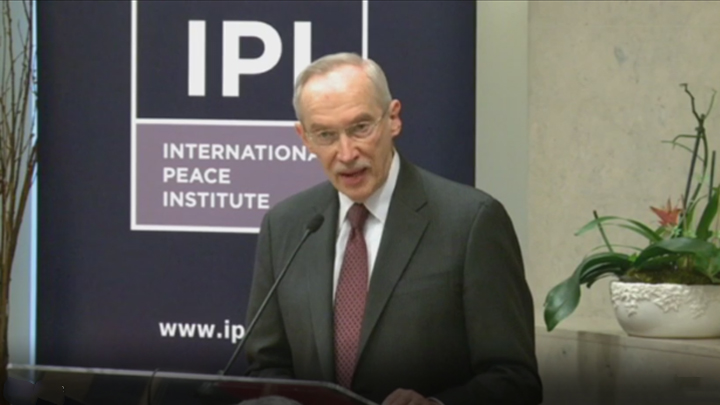The changing nature of conflict and the emergence of new, asymmetric threats have raised the need for stronger and more effective partnerships in peacekeeping operations, particularly between the African Union (AU) and the United Nations. This is what emerged at an April 21st policy forum co-organized by IPI and the Permanent Missions of Egypt, Ethiopia, and Italy to the UN.
“[These] threats and complex operational challenges require a comprehensive, multidimensional approach and credible response mechanisms to maintain and restore peace,” said Sebastiano Cardi, the permanent representative of Italy to the UN. And this, he said, needs to take the form not only of reaction to crises, but very much of action to prevent them.
Violence at the hands of the Islamic State and its recent killings of civilians across the Middle East and North Africa have further underscored the need for better cooperation in peace and security matters, the panelists said. Amr Abdellatif Aboulatta, Egypt’s permanent representative to the UN, said peacekeeping cooperation is essential in that regard. “Capacity building, reliable funding, support for peacekeeping operations, and development of logistical capacity are priority areas,” he said.
Currently, close to 70 percent of the Security Council’s time is devoted to African peace and security issues, said Ethiopia’s Permanent Representative to the UN, Tekeda Alemu. In addition, 87 percent of UN peacekeepers are deployed in Africa through nine peacekeeping operations, a point made by Assistant Secretary-General for Peacekeeping Operations, Edmond Mulet, who delivered the keynote address. It is therefore essential, the panelists said, for the AU-UN cooperation to become stronger and more efficient.
“Cooperation between the two has been underway for some time,” Mr. Alemu said. “It has been very effective, but there is a need for doing more.” There are important assets the AU can offer, the Ethiopian ambassador said, which, coupled with the work of the Security Council, could provide an important contribution to peace on the continent.
In December 2008, a special AU-UN panel on the modalities for support to AU operations published a report—commonly known as the Prodi Report, after its author, former Italian prime minister Romano Prodi—that highlighted the need for joint cooperation between the AU and the UN. The report made recommendations on how the two organizations can cooperate strategically in matters related to peacekeeping.
“We are hopeful that the Prodi Report will be implemented,” Mr. Alemu said. “It contains a number of very interesting ideas in connection with enabling the AU and the AU Peace and Security Council to play a more effective role in peace operations.”
In his address, Mr. Mulet outlined the practical challenges that peacekeeping missions face on the ground and how these have raised the need for stronger cooperation.
“Peacekeepers are increasingly deployed in places where there is no obvious political track, and carrying out our core mandate, the protection of civilians, becomes ever more challenging,” he said. “This, and the related regionalization and globalization of crises, requires partnerships… where we conduct operations as a joint collective endeavor between the UN and regional organizations, as no organization on its own can offer the multifaceted responses we need.”
Nowhere is this more evident than in Africa, Mr. Mulet said, and particularly in Mali and the Central African Republic (CAR) where the respective UN missions MINUSMA and MINUSCA have benefited greatly from the political and military support provided by the AU and the European Union.
“Mali and CAR are indeed timely illustrations of the level of maturity and complementarity reached by the United Nations, the African Union, the European Union, and their peacekeeping partnership,” the UN official said.
Looking at the broader context, Mr. Mulet welcomed the recent announcements of the Arab League and the Association of Southeast Asian Nations (ASEAN) to develop their own peacekeeping forces.
The forum was moderated by IPI Senior Adviser John Hirsch and constituted the first part of an all-day event that discussed the topic in light of the UN’s 70th anniversary and the ongoing peace operations review process.
Watch event:








